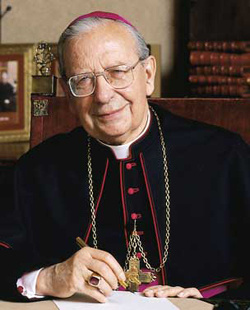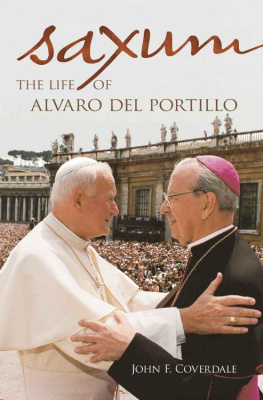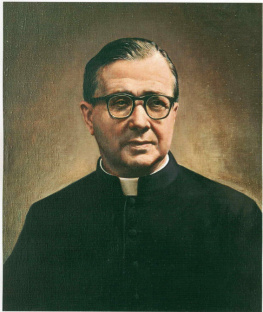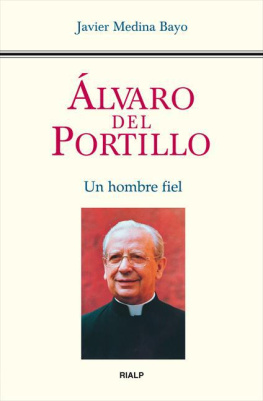Salvador Bernal - Alvaro del Portillo
Here you can read online Salvador Bernal - Alvaro del Portillo full text of the book (entire story) in english for free. Download pdf and epub, get meaning, cover and reviews about this ebook. year: 0, publisher: Scepter Publishers, genre: Detective and thriller. Description of the work, (preface) as well as reviews are available. Best literature library LitArk.com created for fans of good reading and offers a wide selection of genres:
Romance novel
Science fiction
Adventure
Detective
Science
History
Home and family
Prose
Art
Politics
Computer
Non-fiction
Religion
Business
Children
Humor
Choose a favorite category and find really read worthwhile books. Enjoy immersion in the world of imagination, feel the emotions of the characters or learn something new for yourself, make an fascinating discovery.
- Book:Alvaro del Portillo
- Author:
- Publisher:Scepter Publishers
- Genre:
- Year:0
- Rating:5 / 5
- Favourites:Add to favourites
- Your mark:
- 100
- 1
- 2
- 3
- 4
- 5
Alvaro del Portillo: summary, description and annotation
We offer to read an annotation, description, summary or preface (depends on what the author of the book "Alvaro del Portillo" wrote himself). If you haven't found the necessary information about the book — write in the comments, we will try to find it.
Alvaro del Portillo — read online for free the complete book (whole text) full work
Below is the text of the book, divided by pages. System saving the place of the last page read, allows you to conveniently read the book "Alvaro del Portillo" online for free, without having to search again every time where you left off. Put a bookmark, and you can go to the page where you finished reading at any time.
Font size:
Interval:
Bookmark:
Alvaro del Portillo
Bishop Prelate of Opus Dei
by
Salvador Bernal
This edition ispublished by Little Hills Press Pty. Ltd. 37 Alexander Street Crows Nest NSW2065 Australia
email:
ISBN 1-86315-134-6(paperback) ISBN 1-86315-135-4 (hard cover)
First published in Spanish by EdicionesRialp as Recuerdo deAlvaro del Portillo, Prelado del Opus Dei in 1996.
Scriptor, S.A., 1996.
Spanishedition, Ediciones Rialp, S.A., 1996.
English edition,Little Hills Press Pty. Ltd., 1999.
Published in the United States of Americaby
Scepter Publishers, Inc.
P.O. Pox 1270
Princeton, NJ 08542
United States of America
Fax (609) 683-8780
email:
ISBN 1-889334-18-9(paperback) ISBN 1-889334-17-0 (hard cover)
All rights reserved. Nopart of this publication may be reproduced, stored in a retrieval system, or transmitted in anyform or by any means, electronic, mechanical, photocopying, recording orotherwise, without the prior permission in writing ofLittle Hills Press Pty. Ltd .
Contents
About the author
Salvador Bernal is most widely known asthe author of the first published biography of Blessed Josemara Escriv deBalaguer, Apuntes sobrela vida del Fundador del Opus Dei (publishedin English as Profile ofMonsignor Josemara Escriv). Firstappearing in 1976, this book has sold over 100,000 copies in Spain alone, andhas been translated into English, French, Italian, Portuguese, German, Dutch,Japanese, and Polish.
From 1976 to 1994,Salvador Bernal had the opportunity to spend many hours with Don Alvaro delPortillo, who in 1975 was elected to succeed Blessed Josemara as head of OpusDei. This book is a loving portrait drawn on the basis of his own many personalexperiences, as well as an abundance of previously unpublished testimonies fromothers.
Born in Segovia in1941, Salvador Bernal has lived mostly in Madrid. He has doctoral degrees inlaw (Barcelona, 1968) and in journalism (Madrid, 1969). From the late fiftieson, he has had many articles and essays published in various newspapers and magazines. Currently he is president and chiefeditor of the Madrid publishing company Aceprensa.
Introduction
In the early hours of March 23, 1994,Bishop Alvaro del Portillo, the Prelate of Opus Dei, died in Rome. I heard thenews a bit after nine in the morning and soon found myself drafting an articlewhich had to be sent to a newspaper in Madrid before five in the afternoon. Butdespite the pressure, my heart was filled with the same feelings I had had onJune 26, 1975, when Monsignor Josemara Escriv died. I was even writingsimilar words, as I found when I reread a column I had written back then,almost twenty years before, entitled "Changing Tears into Prayer."
"We cry when someone dies; we feel sorrow,our heart is grieved, and everything is filled with bitterness," SaintAugustine wrote in his Confessions. How well he knew thecontradictions of the human heart, and the powerlessness of created things tosatisfy its hunger for happiness. There were no better words to describe thepain I felt that morning in March. And it grew even sharper as the realizationbegan to sink in that I would never again see the lovable face of this man who,though worn out by a thousand battles, constantly lavished affection on peopleand never lost the youthfulness of love.
From 1976 to shortlybefore his death, I spent many hours at his side. With others, I spent manysummers with him, both at work and in times of recreation, far from his usualdaily round in Rome; and often I also went there, to the Eternal City, to workon projects he entrusted to me. And so, very soon after his death, I felt I just had to make the affable but strongcharacter of Alvaro del Portillo widely known. Especially since he had alwaystried his best to hide himself away, even to the point of disappearing behindthe founder of Opus Dei. He was indeed "a most faithful son and successorto Blessed Josemara," to borrow a phrase from the prayer approved by theVatican for private devotion to him.
In October 1976 my Profile of Monsignor Josemara Escriv waspublished, and this book has been widely read. Hence, in presenting now thisbook about Don Alvaro, I want my readers to understand that I am trying todescribe his personality primarily from memory, on the basis of my ownexperiences, though obviously I will have to mention other events and facts aswell. What I have to say is organized around important moments in Don Alvaro'sbiography, but it is particularly inspired and supported by episodes of which I myself was a witness.
I must give anotherwarning: These pages presuppose a certain knowledge of the history of Opus Deiand its founder. I have only included whatever details might be necessary toform a framework for my own impressions. Later on, if necessary and whenpossible, this memoir will be supplemented with further testimony in the form ofpublished books, documents, and so forth and with the autobiographical detailswhich crop up in the writings of Don Alvaro himself. But the latter, I feelsafe in predicting, will be few and far between. If he ever spoke abouthimself, it was just for the sake of a good laugh, or else because not doing sowould have made it more difficult to articulate exactly and faithfully aparticular trait of the founder. For there can be no doubt that the human andChristian virtue of fidelity, which in him was both innate and heroic, summedup the life of Alvaro del Portillo.
Furthermore, I havetried to keep in mind an idea I learned from him in August 1976, when hehimself was doing historical research. He wanted, he said, to reflect howMonsignor Escriv had lived the theological and moral virtues in crescendo, in the different stages of his life hereon earth. To achieve this, he believed, it would of course be very important tonarrate actual events. But one would also have to avoid the dangerespeciallyfor those who had come to Opus Dei only a short time before, or who had notknown the founder personallyof ending up giving just a series of anecdotes andnot an overall vision of his profoundly Christian vision and his deep sanctity.
Such care mustespecially be taken by anyone writing about Alvaro del Portillo, because hislife was imbued with that "charism of normality" which characterizesall those humble people who reach the summit of perfection without doinganything out of the ordinary. One night in 1985, at Solavieya, a conferencecenter in the Spanish province of Asturias, I jotted down in my diary thesewords: "Another day, all very ordinary, with that feeling ofserenityfilled with prayer and with workthat you always get when you're nearDon Alvaro." He was the very incarnation of the lay spirituality of OpusDei. So much so, in fact, that in his presence there came to mind these wordsfrom Blessed Josemara about the Blessed Virgin: "Mary sanctifies theordinary everyday thingswhat some people wrongly regard as unimportant andinsignificant: everyday work, looking after those closest to you, visits tofriends and relatives. What a blessed ordinariness, that can be so full of loveof God!" (Christ IsPassing By, no. 148).
When I think of DonAlvaro, there come to my mind some really paradoxical ideas: supernaturalnaturalness, everyday heroism, extraordinary normality. But I honestly dobelieve that his cooperation with the grace of God transformed the mostcommonplace, nondescript circumstances of everyday life into something holy, oreven divine. To borrow the words of Opus Dei's founder, he translated the proseof everyday life into heroic verse. He put beats and accents of eternity onordinary existence, even on the very smallest things. And he did everythingwith a deep humility which overflowed into meekness and self-forgetfulness.Once again we are faced with the paradoxical effect that men and women of Godhave on others. They try to hide themselves away so that only Jesus shinesforth (to borrow, again, the words of Blessed Josemara), and yet theirhumility speaks so loudly that many souls find the path to God by following thesound of it.
Font size:
Interval:
Bookmark:
Similar books «Alvaro del Portillo»
Look at similar books to Alvaro del Portillo. We have selected literature similar in name and meaning in the hope of providing readers with more options to find new, interesting, not yet read works.
Discussion, reviews of the book Alvaro del Portillo and just readers' own opinions. Leave your comments, write what you think about the work, its meaning or the main characters. Specify what exactly you liked and what you didn't like, and why you think so.











